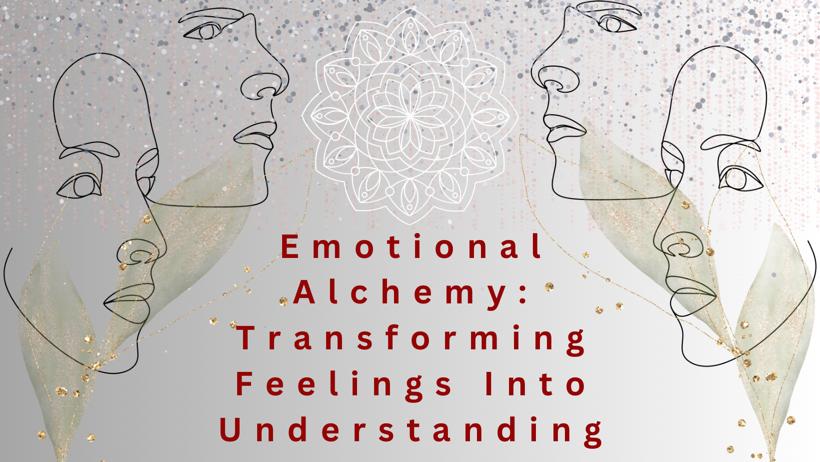
“In the journey of life, we often encounter obstacles and challenges that test our emotional resilience. Yet, within these challenges lie incredible opportunities for growth, transformation, and the alchemy of our emotions. This concept of emotional alchemy – the process of transforming challenging emotions into positive, empowering experiences – is a profound and vital aspect of our emotional intelligence and well-being.” [1]
So, what is emotional alchemy?
“At its core, it’s the art of transforming raw, often overwhelming emotional energy into something purposeful, healing, and even beautiful. It’s not about bypassing your feelings—it’s about decoding them, using them, and growing through them. You emotionize. You alchemize. You evolve.
- What is emotional alchemy? It’s the transformative process of turning intense emotions like anger, guilt, or fear into personal insight, healing, and growth.
- Emotional alchemy meaning: Rather than suppressing emotions, you learn to emotionize—listening to emotions as messengers and using them as fuel for positive change.
- Why it matters: Practicing emotional alchemy empowers you to navigate trauma, break patterns, and reclaim your emotional power with clarity and intention.” [2]

How to Practice Emotional Alchemy
“You don’t need to disappear into a meditation retreat to start emotionizing. Here’s how to make the process real—on your terms:
- Name what you feel. Seriously. Stop and say it out loud. “I feel rage.” “I feel shame.” “I feel numb.” That’s power.
- Pause the reaction. That moment—the pause—is the most radical act of freedom. Focus on your breath. Let it anchor you.
- Decode the message. Ask: What is this emotion telling me? Is it a boundary issue? A pattern? A need unmet.
- Channel the energy. Emotions are energy in motion. Use it. Move your body. Write. Create. Speak. Change.
- Take aligned action. Let the emotion guide—not dictate—your next move. Let it fuel growth, not destruction.
This is the essence of emotional alchemy: using emotion as a spark, not a snare.” [2]

The Emotion is the Messenger
“The first step is to see our emotions as messengers. They are of immense value and provide us with valuable information. Anger may mean that our standards have been violated. Guilt may indicate that we have been in breach of our own standards. Anxiety is a way of alerting us to danger. These emotions are part of our survival kit. They are there to help us shape and experience our lives.
Sometimes the messenger can be over zealous or off kilter, and we find ourselves responding very intensely or inappropriately to situations. There is value in assessing how you are responding to things. Noticing how reliable, biased or true your messengers seem to be.
We can also get very caught up in the form the messenger takes. Seeing the emotion as the end point rather than as a signpost along our way.” [3]
Schemas: Recognize and challenge self-defeating emotional patterns
“Schemas dictate their own reality—things as they seem while we are under their spell.
Schemas are deep-seated emotional patterns that shape our perceptions, thoughts, and behaviors. These patterns often develop in childhood and can persist throughout our lives, influencing how we interpret and respond to various situations.
Common schemas include:
- Abandonment: Fear of being left alone or rejected
- Emotional deprivation: Belief that one’s emotional needs will never be met
- Unlovability: Feeling fundamentally flawed or unworthy of love
- Mistrust: Suspicion of others’ intentions and motives
- Subjugation: Tendency to suppress one’s own needs to please others
Recognizing our schemas is the first step toward change. By becoming aware of these patterns, we can begin to challenge the distorted beliefs that fuel them and develop more adaptive ways of thinking and behaving.”

Mindfulness: Cultivate awareness to break the chain of emotional habits
“Mindfulness gives us breathing space from this conditioning.
Mindfulness practice is a powerful tool for developing awareness of our thoughts, emotions, and behaviors. By cultivating a non-judgmental, present-moment focus, we can create space between our habitual reactions and our responses.
Benefits of mindfulness in emotional work:
- Increased self-awareness
- Reduced reactivity to emotional triggers
- Enhanced ability to observe thoughts without attachment
- Greater emotional regulation
- Improved focus and concentration
Regular mindfulness practice, such as meditation or mindful breathing exercises, can help us develop the mental clarity and equanimity needed to work effectively with our emotional patterns. This awareness allows us to interrupt the automatic chain of emotional reactions and make more conscious choices.” [4]
Living the Alchemy Every Day
” Practicing Emotional Alchemy daily involves staying present with our emotions, recognizing their fleeting nature, and using them as guides for a more enlightened and fulfilling life. Each emotional experience, whether filled with joy or challenge, presents an opportunity for deeper growth and insight.
It is not just a concept; it’s a pathway to self-mastery and enlightenment. By embracing this practice, we open up to a life where every emotion is a step toward deeper understanding, balance, and fulfillment. This journey invites us to fully engage with our emotional spectrum, transforming each moment into a milestone on our path to our highest self.”

Resources
[2] https://www.urevolution.com/blogs/magazine/what-is-emotional-alchemy
[3] https://www.chantryhealth.com/emotional-alchemy/
